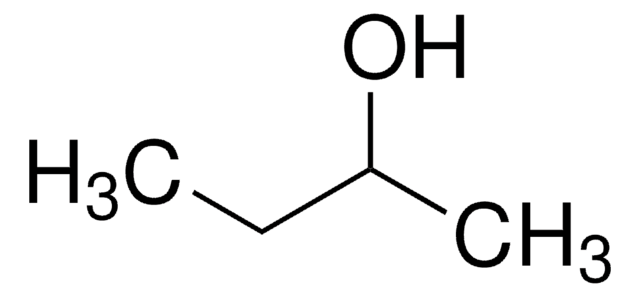77664
3-Methyl-1-butanol
analytical standard
Synonym(s):
Isoamyl alcohol, Isopentyl alcohol
About This Item
Recommended Products
grade
analytical standard
Quality Level
vapor density
3 (vs air)
vapor pressure
2 mmHg ( 20 °C)
Assay
≥98.5% (GC)
autoignition temp.
644 °F
shelf life
limited shelf life, expiry date on the label
expl. lim.
1.2-9 %, 100 °F
technique(s)
HPLC: suitable
gas chromatography (GC): suitable
impurities
≤0.3% water
refractive index
n20/D 1.406 (lit.)
bp
130 °C (lit.)
mp
−117 °C (lit.)
density
0.809 g/mL at 25 °C (lit.)
application(s)
cleaning products
cosmetics
flavors and fragrances
food and beverages
personal care
format
neat
SMILES string
CC(C)CCO
InChI
1S/C5H12O/c1-5(2)3-4-6/h5-6H,3-4H2,1-2H3
InChI key
PHTQWCKDNZKARW-UHFFFAOYSA-N
Looking for similar products? Visit Product Comparison Guide
General description
Application
Signal Word
Danger
Hazard Statements
Precautionary Statements
Hazard Classifications
Acute Tox. 4 Inhalation - Eye Dam. 1 - Flam. Liq. 3 - Skin Irrit. 2 - STOT SE 3
Target Organs
Respiratory system
Storage Class Code
3 - Flammable liquids
WGK
WGK 1
Flash Point(F)
110.3 °F - closed cup
Flash Point(C)
43.5 °C - closed cup
Regulatory Listings
Regulatory Listings are mainly provided for chemical products. Only limited information can be provided here for non-chemical products. No entry means none of the components are listed. It is the user’s obligation to ensure the safe and legal use of the product.
FSL
Group 4: Flammable liquids
Type 2 petroleums
Hazardous rank III
Water insoluble liquid
ISHL Indicated Name
Substances Subject to be Indicated Names
ISHL Notified Names
Substances Subject to be Notified Names
JAN Code
77664-5ML:4548174015964
77664-BULK:
77664-1ML:4548174015957
77664-VAR:
Choose from one of the most recent versions:
Already Own This Product?
Find documentation for the products that you have recently purchased in the Document Library.
Customers Also Viewed
Our team of scientists has experience in all areas of research including Life Science, Material Science, Chemical Synthesis, Chromatography, Analytical and many others.
Contact Technical Service















